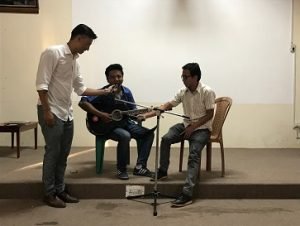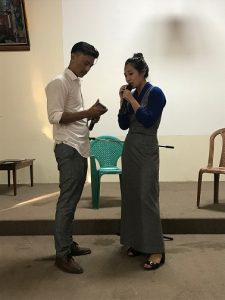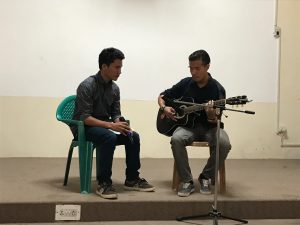Report
Active Nonviolence Education Center
(ANEC)
Two Days Training Program on Universal Nonviolence and Conflict Reconciliation for Teacher Trainees of College for Higher Tibetan Studies, Sarah, Dharamshala, H.P
Organized by:
Active Nonviolence Education Center
Venue:
College for Higher Tibetan Studies, Sarah, Dharamshala, H.P
Date:
6th October to 7th October, 2017
Chief Resource Persons
Rabbi Everett Gendler &
Dr. Mary Gendler
Workshop Facilitators:
Ms. Tenzin Lhamo (Trainer and Research officer –ANEC)
Ms. Tenzin Lhaze (Asstt. Trainer and Teaching Officer – ANEC)
Mr. Jigme (Accountant and Office Secretary –ANEC)
Guest Speakers:
Geshe Ngawang Sangay
Ven Ngawang Woeber
Participation Profile:
Male Participants –17
Female Participants- 15
Total participants- 32
Methodology:
*Power Point Presentation
*Group Discussion and Presentation
*Role Play
*Brain Storming
*Movie Screening
*Lecture
*Story telling
*Feedback
Resource Materials Distributed:
*Note pad, file and pen to each participant.
*ANEC Introductory Brochures.
*Leaflet containing 198 nonviolent methods by Gene sharp.
Medium of Communication:
Tibetan, English.
Report Prepared by:
Tenzin Lhaze (Ms.) Assistant Trainer and Teaching officer
Checked by:
Tenzin Lhamo (Ms.) (Executive Director)
DAY ONE
(Friday, 6th October, 2017)
ANEC has organized a two days workshop on universal nonviolence and conflict reconciliation for teacher trainees of College for Higher Tibetan Studies, Sarah.
9:00-9:15AM
Mr. Passang Tsering, principal of Sarah College for Higher Tibetan Studies inaugurated the workshop by graciously greeting chief resource person Rabbi Everett Gendler and Dr. Mary Gendler along with ANEC staff. He spoke on the importance of Nonviolence and nonviolent strategy to lead a peaceful life and urged all the participants to try their best in understanding the concept of nonviolence as it is the only effective tool for our struggle and to make this world a better place to live. With utmost reverence he appreciated Rabbi Everett Gendler and Dr. Mary Gendler for their ongoing supports and guidance in educating Tibetans in exile regarding the concept of active nonviolence for over two decades.
9:15-9:25 AM
Miss Tenzin Lhamo, interim Executive Director has given an introduction of ANEC and how and why it was formed under the guidance of His Holiness the 14th Dalai Lama and with relentless efforts of Rabbi Everett Gendler and Dr. Mary Gendler. She added ANEC as an organization completed 10 successful years and celebration was made just yesterday at LTWA Hall, Gangkyi; Dharamshala in the presence of members representing different governmental and non-governmental offices, institutions and organizations. The program was revitalize by the grace of former Kalon Tripa, Professor Samdhong Rinpoche as a chief Guest.
9:20-9:35 AM
Rabbi Everett Gendler introduced himself, gave brief introduction of the background and goal of institutionalizing Active Nonviolence Education Center and emphasized on importance of nonviolence.
Dr. Mary Gendler introduced herself and genuinely expressed her expectations and hopes for a better community through active nonviolence. She shared her husband and her experience during their visit to Tibet in 1995. How and what makes them thought of educating Tibetans in exile regarding active nonviolence and nonviolent strategies
Participants had given self introduction followed by group photo.
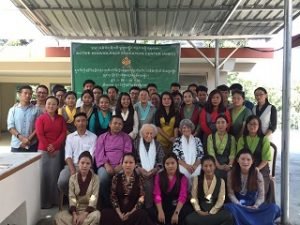
9:45-10:10 AM
ANEC introductory documentary movie: “A Journey of nonviolence; Alabama to Dharamshala” was screened.
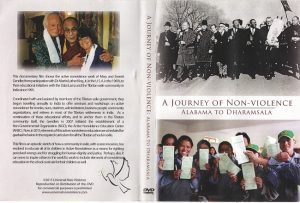
10:10 – 10:40 AM
We have divided the participants into four groups and each group list nonviolence related word they can think of and form it into a sentence. Two participants representing each group read out the sentences they formed and explained. This was to give them a brain storming exercise to create their own definition of nonviolence. Also to provide them a platform to think on their own and create innovative idea of what they thought of nonviolence is. They all came up with beautiful and logical definitions.

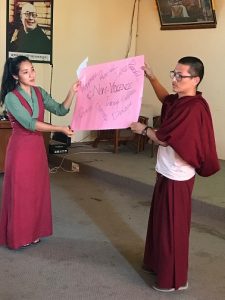
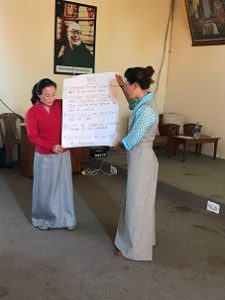
Nonviolence definition formed by the participants:
*Nonviolence is the key factors to refrain from violence and a skillful ways to resolve any problem.
*Nonviolence is all about not hurting others. Its strategy is through Dialogue.
*Nonviolence is a creative way of Dialogue and a peaceful activity to solve conflicts between person, Nations and Countries.
* Nonviolence is any act or movements which starts with the peace and ends with happiness.
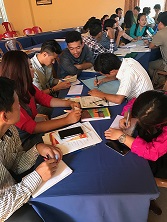
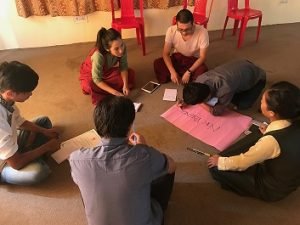
10:40 – 11:00 AM
Ms. Tenzin Lhamo, interim executive director and Trainer cum Research officer, begin with a question for the participants about why they have put non-(hyphen)-violence during their previous exercise. Participants came up with different reasons like non and violence are two words, it look beautiful to put hyphen in between etc. She then taught the participants regarding the difference between “Non-(hyphen)-Violence and Nonviolence. Followed by question answer session until all the doubts were cleared.
11:00 – 11:15 AM
Tea Break
11:15 – 11:50 AM
ANEC’s Chief Resource Person and Principal Supporter Rabbi Everett Gendler added information to the non-(hyphen)-violence and nonviolence ANEC Trainer talk on. He gave talk on Active Nonviolence to the participants and kinds of feeling and emotions associated with nonviolence by asking questions and brainstorming. He also emphasized that nonviolence action does not imply coward or timid rather it is most brave action one could expect under intense circumstances such as highlights the importance of nonviolence action and what active nonviolence actually means. He further talked on about “Universal Nonviolence Training” A Moral equivalent of Universal Nonviolence Training, where in they focused on Spiritual Elements, Physical Elements, Intellectual Elements, Emotional Elements, Social Elements and Cultural Elements.
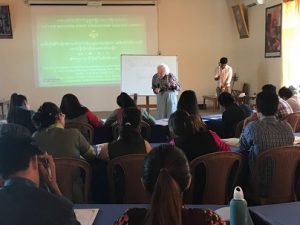
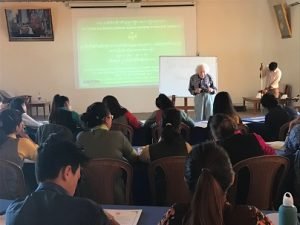
11:50-12:30 PM
Dr. Mary Gendler talked on why it is important to understand our emotions and how to control them especially when it comes to relating these emotions to the Tibetan struggle. She had emphasized on those emotions which were resulted due to the Chinese repressive policies in Tibet and how to channelize those emotions in a constructive ways. She also demonstrated how to make friendly body language with Chinese people and how much a small sign of friendly expression can bring an effective communication with Chinese people.
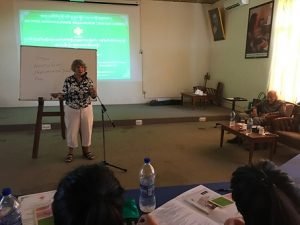
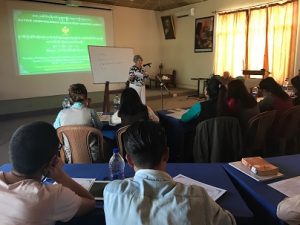
12:30 -1:00 PM
Ms. Tenzin Lhamo trained the participants on various means of nonviolent communication which helps in dealing with our emotion. She introduced four different types of nonviolent communication and four different ways of listening. She further explained how nonviolent communication can effectively assist in conflict resolution.
1:00-2:00 PM
One hour lunch break
2:00-2:20 PM
Refreshment activity called Tapestry was introduced to the participants. The participants were asked to make a large circle. Due to lack of space, we managed to form two different circles. Ms. Tenzin Lhaze hold the end of the yarn and say some something nice about someone in the circle and holds the yarn and pass the roll to the next and it goes on until it become one large web that illustrated the contentedness of the group. The motive behind this activity is to practically show- in order to build peaceful community, one must respect each other and also after lunch, activity is needed to keep the mind alert and body active.
2:20- 3:00 PM
Ms. Tenzin Lhaze, Assistant Trainer talked about what Conflict is and further explained four different type of Conflict; Pathway Conflict, Mutually Exclusive Conflict, Distributive Conflict and Values Conflict and three intensity levels of conflict and its responses; Normal Level, Pervasive Level and Overt Level with example using power point presentation.
3:00-3:15 PM
Tea Break
3:15-4:00 PM
Miss Tenzin lhaze took another 45 minutes for the role play on four types of conflict and three intensity levels of conflict by involving few participants to make it understand better followed by question answer session.
DAY TWO
(Friday, 7th October, 2017)
9:00AM – 9:20AM
Day two workshop began with Recapitulations of topics that have been taught during the first day of workshop. For our satisfaction all the participants had good knowledge about the yesterday’s topic and ultimately boast up our energy to do even better.
9:00AM – 9:50AM
Miss Tenzin Lhaze explained the six steps of conflict reconciliation by Dr. Martin Luther king Jr. Thereby, Information Gathering, Education, Personal Commitment, Negotiation, Dramatic Direct Action and Reconciliation during civil right movement. And how Mr. King was able to eradicate the segregation and injustice in Montgomery, Alabama by adopting six steps of conflict reconciliation and set an example for the entire world.
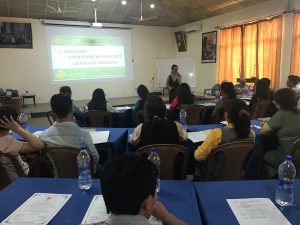
9:50 – 10:20AM
Our Guest Speaker Geshe Ngawang Sangay la gave talk on the Practical Application of Buddhist Philosophy of nonviolence in our Daily life. He explained about how Buddhist principle of nonviolence can help to bring peace and happiness by being contented to what you have in life. He further adds Buddhist nonviolence is basically based on the ideology of impermanence and the behavior of nonviolence to every sentient being.
We know that Buddhism is drawing the attention of many scholars and likewise it has been one of the important and interesting subjects for the generation. Keeping in mind we managed to provide 10 minutes for the question and answer session for the participants to clear their doubts. Participants enthusiastically took part in that session.
10:30 – 11:00AM
Ven Ngawang Woeber who served as a political prisoner, in Chinese prison during the second uprising in Tibet for his nonviolent action against Chinese Govt. was invited to share his personal experience. The motive to invite him is to connect and inspire the participants with the person who actually did faced the brutality and didn’t even lose hope to follow the path of nonviolence. He further shared his experiences when he was in Tibet and had witnessed the oppression by Chinese to innocent Tibetans. He said education is the ultimate and strongest tool we must have. He requested the participants to educate oneself regarding Tibet and China and what is happening around the world. The path of nonviolence may not provide us result sooner but this is the only ultimatum for a fruitful result. So, it is worth to utilize nonviolent strategies.
11:00 – 11:15AM
Tea break
11:15 – 12:00AM
Ven. Ngawang woeber la also enlightened us about the nonviolent strategy and tactics used during first Tibetan uprising (1956 – 59), Second Tibetan uprising (1987-89) and Third Tibetan uprising (2008)
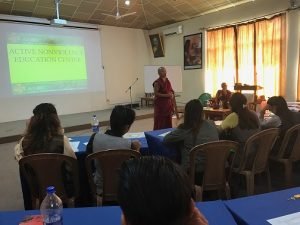
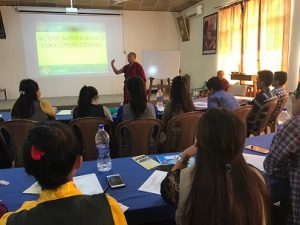
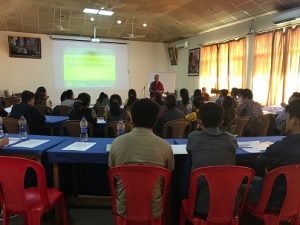
12:00 – 1:00PM
Participants were divided into two groups. A group representing the Tibetans living in Tibet and another group represent living in Exile. They were made to discuss what can be done in Tibet or in exile by using nonviolent strategies to address the injustices. Both the group had enthusiastically made interesting role plays and presentation.
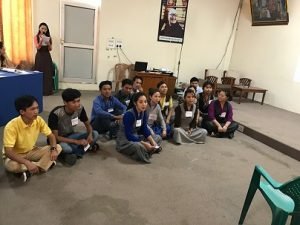
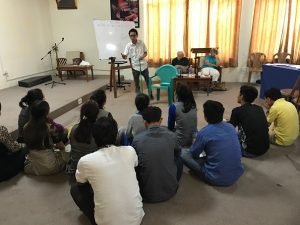
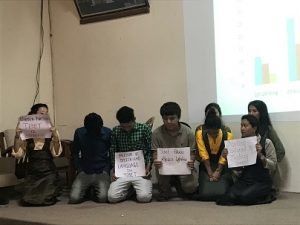
1:00– 2:00PM
Lunch Break
2.00 – 2.20PM
Role plays and discussion continued.
2.20 – 2.50PM
Miss Tenzin Lhamo, Trainer gave presentation on Reasons for Nonviolence and why Tibetans should follow the path of nonviolence. She further reasons that Tibet is economically, militarily and demographically incompetent whereas, Chinese economic and military power is growing day by day. In terms of population, Tibet is nothing in the eyes of China. Hence, resorting to violence is suicidal and unrealistic. Therefore, the best and realistic approach to challenge Chinese regime/authority is through the nonviolent struggle.
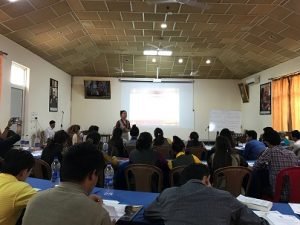
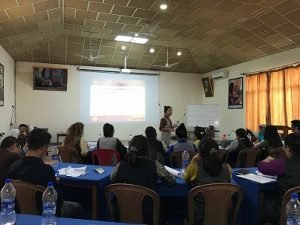
3.00 – 3.40 PM
Rabbi Everett Gendler shared his personal experiences in Birmingham and he feels proud of himself for coming all the way and evolved as a personality who is never afraid of doing anything which is right. And urged all the participants to believe in one’s ability to stand still with good intention no matter how world is full of cruelty and hatred. Dr. Mary Gendler talked on Dr. Gene Sharp’s list of strategies on Economic Non Cooperation. How those strategies can be applicable inside occupied Tibet- focusing on strikes and boycotts. She narrated the two real life stories –“The Khatak Seller in Lhasa” and “The Polish potato Farmer”.
3:40 –4:00PM
- Feedback forms were filled by the participants and collected accordingly. We classified feedback in two parts as constructive feedback and positive feedback.
Positive Feedback:
- Tenzin Norphel (male); Thank you ANEC Institution for giving workshop on Nonviolence. We got many new things about Nonviolence methods.
- Lhamo Chonzon (Female); keep on going. The ANEC is doing a great job.
- Tenzin Tseten(Male); through these two days Nonviolence Programme I learn lots of ne3w things related to Notional and International Political Situation and only peaceful methodology to resolve any problems.
- Jamyang Dorjee( Male); Actually, I feel really satisfied with the Topic and Concept because I got to learn really good things and could able to gathered lot of productive information from these two days workshops.
- Tenzin Jangchup (Male); as for me, everything regarding this workshop was far better than my expectation. I hope the ANEC will be able to enlighten more particularly students and even to the public.
Constructive Feedback:
- Tenzin Wangdak (Male); More time for Question and Answer session is needed. Presentation must be n point with current situation example.
- Karma Sonam Dhargyal (Male); Time management need to get improved. If there is more Activities like Game, which relate to nonviolence and students Exchange Activities should be more.
- Tenzin Choedhen (Female); More of such seminar should be organized in our community especially in schools and youth to have a better ideas about nonviolence.
- Yeshi Dolma (Female); I wish there would be more than 2 days workshop.
- Chogyal Tsering (Male); Thank you ANEC for the workshop. We got more information and further encourage us to know more about adopting different nonviolent ways to educate other people about the cause of Tibet.
4.00 – 4.15 PM
*Rabbi Everett Gendler and Dr. Mary Gendler distributed certificate to all the participants for their dedication and enthusiasm in participation and learning during those two days of workshop which will have an indelible impact in their life.
*Interim Executive Director offered a white scarf and a portrait as a token of gratitude to the principal of College of Higher Tibetan Studies of Sahra, Dharamshala, and H.P
*‘We shall overcome’ song was sung, making a circle and holding each other hand.
*Participants sang songs and played guitar as a gesture of gratitude for workshop facilitators.
